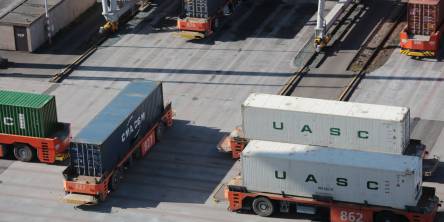7 Most Common Fleet Management Mistakes & Their Solutions

Fleet management is an integral part of a business, which covers vehicle maintenance, driver management, cost control, productivity, compliance, and such other activities. Even the smallest mistake in any of these activities may result in a significant loss to the company in terms of productivity or costs.
Here are the most common fleet management mistakes and their best solutions. This list will help fleet managers to improve fleet efficiency and create cost savings.
1. Not Following Vehicle Maintenance Schedules
Fleet managers have to keep up with the deadlines, tight schedules, and the demand for improving fleet productivity. That is the reason why even experienced fleet managers sometimes fail to set & follow maintenance schedules. As a result, it leads to sudden breakages, and in worst cases, fatal accidents can happen.
Solution: Use a fleet management system to track vehicle maintenance history and follow the schedules. It will ensure the safety and security of your vehicles as well as drivers.
2. Skipping Driver Training
The fleet industry regularly deals with the vehicle advancements, change in road safety laws, and evolving technology in transportation. Therefore, an adequate driver training is crucial for the success of fleet management. However, many fleet managers neglect to plan regular driver training. This mistake can create a significant risk of fleet efficiency.
Solution: A fleet management software can help you to create driver profiles based on their travel routes, average speeds, delivery time, and other details. You can use this information to plan required training for the drivers, which will reduce overall risk, and increase fleet productivity.
3. Not Having a Clear Policy
Many fleets fail to have a clear set of rules as part of the company’s policy. Not having a transparent, logical, and tailored system specifically to the needs of a particular fleet may create chaos in fleet operations.
Solution: Every fleet business should create a document comprising roles and responsibilities for everyone from staff to suppliers. As part of this, a fleet management system can help you to create a policy, which continuously updates according to the changes in federal laws and your company’s rules. Moreover, it can help you to inform all the staff members, suppliers, and customers through system alerts and notifications.
4. Neglecting Telematics
Telematics can provide substantial information about the vehicle’s speed, geographical location, excessive idling, change of routes, and even loading/off-loading activities. However, managers make the mistake of not leveraging telematics, which ends up in failure of fleet management.
Solution: GPS/Telematics can help you to get real-time location notification of a vehicle, driver safety monitoring, vehicle’s idling status, route details, and more. It can help you to turn a legacy fleet management into a streamlined operation.
5. Not Keeping the Logs
Regular logging of vehicle information, driver details, re-routing, dealer database, and more help to streamline fleet management. However, as many fleet managers still prefer to manage the company fleet manually, they fail to keep such critical information updated.
Solution: A fleet management system provides automatic logging feature. This feature can help you to streamline business operations and to create better risk management planning.
6. Not Adapting Predictive Modeling
The fleet industry is highly competitive. Therefore, it is essential to manage company fleets proactively. However, the lack of tools and technology makes it challenging for the fleet owners and managers to predict future problems and industry trends.
Solution: Integrate predictive modeling in the fleet management system. It is an analytics technique, which will help you to predict anything from staff turnover to accidents. As a result, you can solve a variety of problems before they even materialize.
7. Following Inaccurate Reports
In the absence of a proper fleet management system, managers often make strategic decisions based on inaccurate reporting. It affects fleet performance and may lead to a considerable loss to the company.
Solution: As a fleet manager, you should ensure two things; first, the information is coming from the right resource, and second, it is accurate. A custom reporting tool can help you to collect the fleet data in a centralized system and then generate precise reports to measure the performance of the fleet.
Conclusion
Managing a fleet is a fast-paced, continually evolving role as technology, legislation, and customer demands change over time. As part of this, many companies offer fleet management systems to streamline your business operations. However, it is crucial to choose the right fleet management system development partner. They can help you to build a tailor-made fleet management solution to achieve better cost efficiency and improve business productivity.
Similar Articles
In the fast-paced world of supply chain management, it is vital to coordinate logistics operations for businesses aiming to meet customer demands, reduce costs, and stay competitive.
The handling of projects may be characterized as a laborious and complex responsibility. From the formation of employment positions through allocating resources for managing work in progress, significant amounts of business hours and resources are used.
Discover the perfect project management software for your business with our guide. Explore key considerations to streamline your projects effectively. Choose wisely
Unless you live under a rock, you know that television and the overall idea of content consumption have changed drastically and beyond anything we would have imagined three to four decades ago. Over-the-top (OTT) apps continually reshape today's future of television
Unless you have been living under a rock, you know that the modern world has come to rely on mobile apps immensely. From simply being able to send texts to people over the internet to wiring money across the globe — mobile apps help us do it all.
We live in an immensely technologically advanced age. This is why it is no surprise that a rapidly growing number of companies are increasingly deliberating on the big question: is it time to migrate their legacy systems? While we cannot say why an individual company would need to migrate its systems, we do know why most companies want to migrate its legacy systems
Blockchain technology and the concept of a decentralized "Web3" internet have generated tremendous hype and interest in recent years. Beyond cryptocurrencies like Bitcoin, the potential for decentralized applications built on blockchain platforms has been driving innovation.
In today's digital age, a compelling logo is essential for any business or brand looking to establish a strong online presence. Your logo is often the first thing that potential customers see, and it can significantly impact their perception of your brand.
In an era where digital assets and data are the lifeblood of businesses, ensuring robust cloud security has never been more crucial. As a rapidly growing number of companies and other entities in the world embrace cloud computing, it has become vital to focus on the one factor that remains all-important, no matter the technology involved: security.









